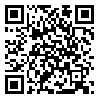Volume 11, Issue 1 (Autumn 2025)
Health in Emergencies and Disasters Quarterly 2025, 11(1): 53-64 |
Back to browse issues page
Download citation:
BibTeX | RIS | EndNote | Medlars | ProCite | Reference Manager | RefWorks
Send citation to:



BibTeX | RIS | EndNote | Medlars | ProCite | Reference Manager | RefWorks
Send citation to:
Nosratabadi M, Amini-Rarani M, Atighechian G. Are Iranian Medical Sciences Curricula Equipped to Effectively Respond to Incidents and Disasters? A Content Analysis. Health in Emergencies and Disasters Quarterly 2025; 11 (1) :53-64
URL: http://hdq.uswr.ac.ir/article-1-628-en.html
URL: http://hdq.uswr.ac.ir/article-1-628-en.html
1- Social Determinants of Health Research Center, Isfahan University of Medical Sciences, Isfahan, Iran.
2- Health Management and Economics Research Center, Isfahan University of Medical Sciences, Isfahan, Iran.
3- Department of Health in Disasters and Emergencies, Health Management and Economics Research Center, School of Health, Isfahan University of Medical Sciences, Isfahan, Iran. ,atighechian_golrokh@yahoo.com
2- Health Management and Economics Research Center, Isfahan University of Medical Sciences, Isfahan, Iran.
3- Department of Health in Disasters and Emergencies, Health Management and Economics Research Center, School of Health, Isfahan University of Medical Sciences, Isfahan, Iran. ,
Abstract: (1805 Views)
Background: We live in a world with rapidly accelerating hazards, both natural and man-made. Medical science plays a crucial role in disaster management by enhancing preparedness and response capabilities. The purpose of this study was to examine the content of the official medical science curriculum from the perspective of incidents and disasters.
Materials and Methods: In this qualitative content analysis study, the content of the official curricula of undergraduate and postgraduate degrees in Iran’s Ministry of Health and Medical Education (MOHME) was explored from a disaster and emergencies point of view. All undergraduate and postgraduate disciplines (320 courses) were identified. The curricula of the disciplines were then screened, and those unrelated to disaster and emergencies were excluded based on face validity (n=285). Finally, the remaining disciplines (n=35) were carefully read and analyzed.
Results: At the undergraduate level, most of the topics related to disaster and emergencies belonged to anesthesia (19 times). In the master’s degree, the field of radiation medicine has the most codes related to incidents and disasters (13 times). Regarding the PhD majors and medical doctor course, codes related to disasters and emergencies were mentioned 10 times in the field of toxicology.
Conclusion: It is suggested that, considering the broad variety of disasters and emergencies, it is not advisable to design generic topics for all fields of medical science. Instead, it is more important to propose specialized topics based on specific needs and in a theoretical-practical manner for each major and different educational levels.
Materials and Methods: In this qualitative content analysis study, the content of the official curricula of undergraduate and postgraduate degrees in Iran’s Ministry of Health and Medical Education (MOHME) was explored from a disaster and emergencies point of view. All undergraduate and postgraduate disciplines (320 courses) were identified. The curricula of the disciplines were then screened, and those unrelated to disaster and emergencies were excluded based on face validity (n=285). Finally, the remaining disciplines (n=35) were carefully read and analyzed.
Results: At the undergraduate level, most of the topics related to disaster and emergencies belonged to anesthesia (19 times). In the master’s degree, the field of radiation medicine has the most codes related to incidents and disasters (13 times). Regarding the PhD majors and medical doctor course, codes related to disasters and emergencies were mentioned 10 times in the field of toxicology.
Conclusion: It is suggested that, considering the broad variety of disasters and emergencies, it is not advisable to design generic topics for all fields of medical science. Instead, it is more important to propose specialized topics based on specific needs and in a theoretical-practical manner for each major and different educational levels.
Type of article: Research |
Subject:
Qualitative
Received: 2024/06/8 | Accepted: 2025/02/15 | Published: 2025/10/1
Received: 2024/06/8 | Accepted: 2025/02/15 | Published: 2025/10/1
Send email to the article author
| Rights and permissions | |
 |
This work is licensed under a Creative Commons Attribution-NonCommercial 4.0 International License. |








